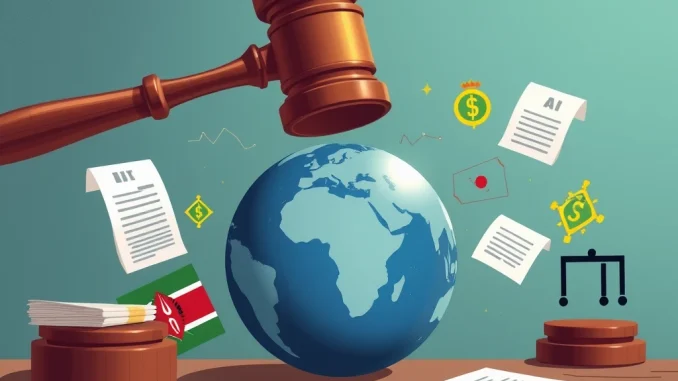
A significant legal development has unfolded in Kenya, directly impacting the operations of Worldcoin, the ambitious project aiming to create a global identity and financial network. The High Court in Nairobi has issued a landmark ruling, ordering Worldcoin to take drastic action: delete all biometric data it has collected from individuals within the country.
Why Did the Kenya Court Rule Against Worldcoin?
The court’s decision stems from concerns over how Worldcoin gathered sensitive information. According to reports, the ruling highlights two primary issues:
- Lack of Authority: The court found that Worldcoin collected sensitive biometric data without proper authorization from the Kenyan Office of the Data Protection Commissioner (ODPC). Data protection laws require specific consent and legal basis for processing such sensitive information.
- Data for Crypto Exchange: A key part of Worldcoin’s sign-up process involved scanning users’ irises (biometric data) in exchange for crypto assets, specifically Worldcoin (WLD) tokens. The court’s ruling implies this method of collection and exchange raised red flags regarding the voluntariness and legality of obtaining sensitive personal data.
This ruling represents a major Worldcoin legal challenge, forcing the project to confront regulatory hurdles in a key African market.
Understanding Worldcoin’s Biometric Data Collection
Worldcoin’s core technology relies on the ‘World ID,’ a digital identity designed to prove unique personhood. To obtain a World ID, users typically undergo an ‘Orb’ verification process, where a specialized device scans their iris. This biometric scan is intended to generate a unique code that verifies the user is a real, unique human, without necessarily linking the code back to their specific identity after the initial verification (according to Worldcoin’s design principles). However, the collection of this highly sensitive biometric data Worldcoin utilized has been a point of contention globally.
The project argues this method is necessary to prevent bots and fraud in its attempt to distribute a form of universal basic income via its token. However, regulators and privacy advocates worldwide have raised concerns about the storage, security, and ethical implications of collecting iris scans on a massive scale.
What Does This Mean for Worldcoin Kenya Operations?
The High Court’s order to delete all collected data is a severe blow to Worldcoin’s presence in Kenya. The project had seen significant sign-ups in the country before operations were suspended by the government in August 2023 due to data privacy and security concerns. This court order solidifies the legal basis for halting their data collection activities and mandates the destruction of previously acquired information.
Key implications for Worldcoin Kenya include:
- Immediate cessation of any remaining data processing activities related to Kenyan users’ biometrics.
- The logistical and technical challenge of identifying and permanently deleting the specific data collected in Kenya.
- A potential chilling effect on future biometric-based projects in the country.
- The need for Worldcoin to engage extensively with Kenyan authorities if they ever hope to resume operations under compliant terms.
The Broader Implications for Data Privacy and Crypto Projects
This ruling by the Kenya court Worldcoin faced sends a strong signal to global tech and crypto projects operating in the country and across Africa. It underscores the growing importance of adhering to local data protection laws, which are becoming increasingly robust on the continent. Projects relying on collecting sensitive personal information, especially biometrics, must ensure they have explicit legal grounds and regulatory approval before commencing operations.
The case highlights several critical aspects for the future of data and decentralized technologies:
Data protection regulations like Kenya’s Data Protection Act, 2019, are powerful tools for governments to oversee how foreign entities handle their citizens’ information. The exchange of sensitive data for financial incentives, particularly crypto, is under intense scrutiny. Projects must be transparent about data handling and provide users with clear control and understanding of how their information is used.
The Worldcoin data privacy model, while designed with certain privacy features in mind (like zero-knowledge proofs), still faces significant challenges in gaining trust from regulators who prioritize established legal frameworks for data collection and consent.
Concluding Thoughts: A Wake-Up Call for Global Data Practices
The Kenyan High Court’s order for Worldcoin to delete biometric data is more than just a localized legal issue; it’s a global reminder of the increasing tension between rapid technological innovation and fundamental data privacy rights. As projects like Worldcoin push the boundaries of identity verification and financial inclusion using sensitive personal information, they must navigate a complex and evolving landscape of international data protection laws. This ruling serves as a crucial precedent, emphasizing that regulatory compliance and respecting national data sovereignty are paramount for any global digital project seeking to operate successfully and ethically.



